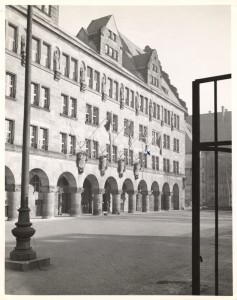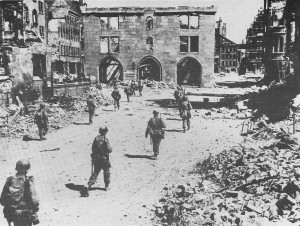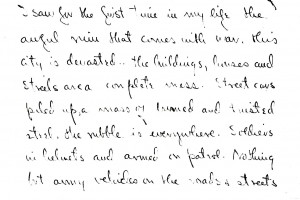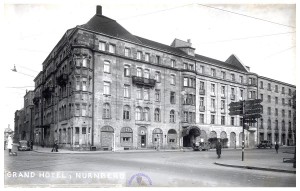With the establishment of the International Military Tribunal (IMT) to be held in Nürnberg, Germany, the real work of creating an appropriate space for the court and the necessary supporting operations began. Thomas J. Dodd, a Connecticut lawyer on the staff of the FBI, was selected by Justice Robert Jackson, the lead prosecutor for the United States, to participate in the herculean task of collecting and sorting through the available documentation to begin formulating the U.S. team’s legal plan for the upcoming trial. Arriving in London in late July 1945, Dodd began gathering information. Writing to his wife, Dodd recounts the devastation of London as a result of bombing and his travels to some of the more well-known sights before moving on to Paris in early August following the finalization of the British, French and Soviet legal teams.
Although frustrated with his assignment, he writes “I have thought of it but have decided to give myself and the job a better chance by way of time. You see it is a Colonel’s clique—from top to bottom—and it is provokingly unpleasant for civilians. I believe a terrible mistake has been made in this respect. It should be run by civilians in the name of the civil population and in the interest of peace by way of contributing to the prevention of war.” [p. 79, 8/7/1945].
Two weeks later, Dodd arrived “in the dead city of Nürnberg…I saw for the first time in my life the awful ruin that comes with war. This city is devastated–the buildings, houses and streets are a complete mess. Streetcars piled up, a mass of burned and twisted steel, the rubble is everywhere. Soldiers in helmets and armed on patrol. Nothing but army vehicles on the roads and streets…” [p. 90, 8/14/1945]
He journeyed through the ruins of the city, exploring many places including his quarters at Hitler’s own Grand Hotel. Severely damaged, the hotel was missing most of the glass in the windows, the walls and floors compromised and made passable with planking, no hot water or heat and yet, “this is the best in this city that was once home to 400,000 people.”
Having settled in as much as was possible, Dodd began the interrogation of the prisoners who had been transferred to the city for the coming trial. Wilhelm Keitel, Alfred Jodl, and Karl Doenitz were transferred from Luxembourg, having been held there until the 10,000 prisoners of war finished reconstructing the courtroom in which the trial would be held.
Between August 14th and 27th, Dodd met with and deposed Alfred Rosenberg (minister of culture and occupied countries), Field Marshall Wilhelm Keitel (chief of staff of the German army), Lieutenant General Alfred Jodl (military operations), and Joachim von Ribbentrop (foreign minister).
Interspersed with the legal preparations, Dodd toured the city and on a brief excursion to Munich, he observed that the “endless procession of refugees goes on—mile after mile on foot, on horse, in wagons. We passed on wagon train a mile long. It looked just like the pictures of covered wagon days in America—even the rounded tops on the wagons—horses and oxen doing the hauling, the men walking, the women and little ones riding. All heading back to Czechoslovakia, to Romania, to Bulgaria, to Austria, to places they call home. Believe me Grace, this movement across Europe is a pitiful thing—and it wrings my heart to see it day after day.” [p. 104-105, 8/25/1945] Dodd was concerned for the refugees, how would they survive throughout the coming winter and could they overcome illnesses or succumb to the cold, exposed to the harsh reality of winter?
Life in Europe had been greatly altered by war and many hoped that justice would prevail as a result of the upcoming trial which would begin once the courtroom was finished; new beginnings and hope in a city damaged almost beyond recognition.
–Owen Doremus and Betsy Pittman
——————————————————————————————————————
[Owen Doremus, a junior at Edwin O. Smith High School, is supporting this blog series with research and writing as part of an independent study.]
The letters from Tom Dodd to his wife Grace have been published and can be found (page numbers are noted) in Letters from Nuremberg, My father’s narrative of a quest for justice. Senator Christopher J. Dodd with Lary Bloom. New York: Crown Publishing, 2007.
Interrogations introduced into evidence are available online as part of the Thomas J. Dodd Papers (http://archives.lib.uconn.edu/islandora/object/20002%3A20)
Images (other than those available in Dodd Papers):
Soldiers of the US 3rd Infantry Division in Nuremberg, Germany on 20 April 1945 (https://en.wikipedia.org/wiki/3rd_Infantry_Division_(United_States)#/media/File:3._US_Inf.-Div._in_N%C3%BCrnberg,_20.04.1945.jpg)
Grand Hotel, Nürnberg, Germany (http://www.usarmygermany.com/Communities/Nuernberg/Partials_Grand%20Hotel.htm





